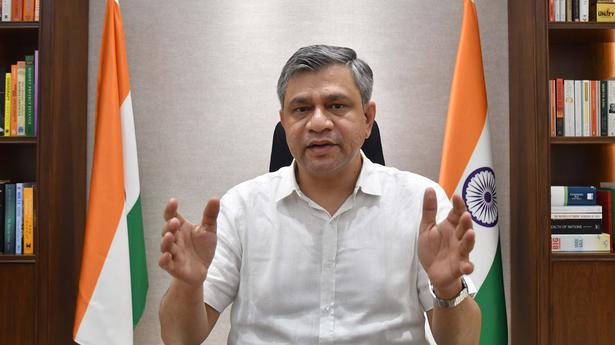
We are working on a comprehensive legal framework for digital economy, says Minister for Communication
The Hindu
‘We have consistently held that India’s laws must be implemented by every company operating in the country’
In an interview with The Hindu, Union Minister for Railways, Communication and Electronics and Information Technology Ashwini Vaishnaw talks about the policy road map for the digital economy, focus on making India ‘Atma Nirbhar’ in telecom technology and recent allegations that the Indian government forced Twitter to employ its agent. He also talks about the government’s plans to improve amenities for railway customers, bring in new engines and upgrade trains, along with efforts to boost revenues from freight services.
We are working on a comprehensive legal framework for the digital economy. It has four dimensions. First is telecom. Telecom is the primary medium of accessing digital services. So, a new telecom Bill to replace laws made in 1885 and 1930 is at an advanced stage of drafting. The stakeholder consultation process is about to be completed. Second will be the data protection Bill. Third is a comprehensive digital India Act that we are preparing to replace the IT Act of 2000 vintage. These are three Bills. Now beyond this, there are certain policy frameworks, for example the national data framework that we have uploaded for consultation, then cybersecurity framework… these are outside the law, but more like a policy framework because of the ever changing technology landscape.
Cybersecurity is a constantly evolving area. Globally, it has been dealt with a techno-legal framework where technology plays a big role and policy is there to support the technology. I don’t think that by putting a law for cybersecurity the threat will vanish. It has to be a techno-legal solution. For that, we have to continuously invest in infrastructure, new processes, training people and making common citizens aware. However, we have to be always on alert to counter ever new threats.
That’s a very serious concern. If they have any flaws in the data protection, they will be held accountable. We expect that each and every social media platform should utilise the best available technologies. They should definitely do everything that is required to protect users’ data. And it is mandated by their own policies…this is a very fair expectation. If they don’t do it, of course they would be held accountable.
I read in the news that Twitter has categorically denied this in front of the parliamentary committee.
The principles of data protection and privacy are now well established all over the world. What is important is to create an easily implementable, highly accessible implementation structure, so that the citizens living in remote areas can also get the same level of grievance redress mechanism that citizens living in cities would get. That is what we need to really work upon — accessible, inclusive, and equitable structure. When a citizen gives data to the government based on a consent framework, and the government uses data analytics to provide better service… as long as it is part of that consent, it fits into all the principles.
Our focus now is to make sure that the implementation of these principles and data protection framework should be in tune with the modern times, should be accessible to everybody, should be very easy to implement and should be born digital. It should not be like we are trying to create a paper system for a digital world. The new draft should be out soon, and we will bring it to Parliament in the budget session.













